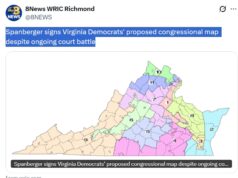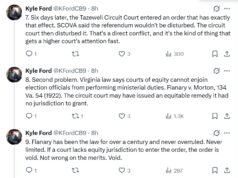by Jeff Thomas
An explosive development in the increasingly beleaguered redistricting referendum came from Richmond this afternoon as a lawsuit was filed in the Supreme Court of Virginia alleging a myriad of constitutional violations. Attorney General Mark Herring was served on behalf of the respondents, the State Board of Elections and its leading officials. There are two broad allegations (the full lawsuit is at the end of the post).
The lawsuit argues the redistricting referendum would turn the Supreme Court of Virginia into a political body.
It seemed to make sense that in the event of a deadlock in the redistricting commission the Supreme Court of Virginia would have the final say on redistricting lines. A number of states operate similarly, but they do not give their state supreme courts the final say in the matter. They mandate that the courts appoint, for example, a commission like California’s, in the event of a political deadlock.
However, unlike any other state, under the Virginia redistricting amendments, Virginia Supreme Court Justices could not constitutionally delegate their authority. The language reads: “the districts shall be established by the Supreme Court of Virginia”. Thus the Justices themselves would bear the responsibility for redistricting and be the defendants or key witnesses in the inevitable multiyear federal lawsuits on redistricting that have happened every decade since the 1960s. Imagine Justices being wrapped up in partisan litigation, deposed and giving testimony about why they chose certain lines and certain neighborhoods, what their partisan, racial or other biases are, and how their decisions were made behind closed doors in regards to alleged breaches of federal law. It is an entirely untenable situation.
Furthermore, if the Virginia Supreme Court had to draw the lines, no state court could ever hear a case on redistricting again. The Supreme Court could not try itself. Thus the amendments insidiously cause citizens to lose their right to go to state court: as the lawsuit notes, “the Referendum wording fails to alert voters to the fact that since a citizen can’t sue the [Virginia] Supreme Court, he or she seemingly may lose their current right to seek judicial review of the failure of a redistricting map to abide by state law.”
The lawsuit convincingly argues that these amendments turn the Supreme Court of Virginia into a political body. Courts have to stick to judicial review and remain apolitical both for separation of powers reasons and for public confidence in the judiciary.
Punting to the Virginia Supreme Court seemed like a good idea at first glance, but it creates a constitutional morass. It’s incredible that the purported experts who worked on this for ten years did not think this through to its logical conclusion.
The lawsuit argues the General Assembly cannot have absolute and unreviewable power to rig elections by putting misleading language on the ballot.
Much of the case relies on the fact that the General Assembly has chosen to put referendum language on the ballot that does not accurately reflect the content of the proposed constitutional amendments. As the lawsuit notes – and this certainly demands an explanation – the General Assembly deliberately chose not to put the full language of the proposed amendments on the ballot. The ballot language does not accurately convey the meaning of the amendments because, among other discrepancies, there are two constitutional amendments being voted on by the people totaling 1,369 new words to the Virginia Constitution, but there is one ballot question with just 89 words that the people will vote on. (You can see the actual full language below to compare. If the amendments are so great, why are they not putting them on the ballot and instead doing this misleading and manipulative summary?)
The lawsuit says there are constitutional consequences. The point of putting constitutional amendments to the voters is that all power flows from the people, and thus we all have the final say on what goes into the Virginia Constitution. The General Assembly is elected to pass laws on the people’s behalf, but they cannot unilaterally modify the Constitution. The lawsuit argues that misleading referendum ballot language is unconstitutional because the General Assembly is unconstitutionally abusing the power and responsibility we have granted them to hold fair elections. The people have the right to vote on fair language, and the General Assembly cannot obviate that right.
It’s an incisive argument. The General Assembly is granted the right and deference to write the ballot language on constitutional amendments – but imagine the following scenario if the General Assembly’s power is truly unfettered in this situation. The General Assembly could pass a constitutional amendment to raise their own salaries by $10,000 per year, but put language on the ballot saying the constitutional amendment would lower their salaries by $10,000 per year, then the people vote for the former thinking they are voting for precisely the opposite, and no citizen can ever go to court to redress this. This clearly cannot be, and the right of the General Assembly to compose ballot language cannot be unreviewable by any court. Elections pit two candidates against each other: putting misleading referendum language on the ballot is tantamount to the government putting its thumb on the scale of an election to disadvantage people opposed to the government’s position. The lawsuit argues that giving the General Assembly an unchallengeable right to draft ballot language that should be neutral cannot be an absolute right that deprives the people of their right to a fair election. It is an abuse of power.
What’s next?
Events are still unfolding, but the following questions come to mind:
- Herring has the discretion not to defend indefensible state positions. The vast majority of elected Democrats, and surely now Democratic voters, are opposed to the referendum. Will Herring defend it in court?
- The petitioner is Paul Goldman, former DPVA chair and current candidate for Lieutenant Governor. His position is undoubtedly the popular one among Democrats. Will other advocates and candidates join the case?
It’s anybody’s guess what might happen in court – but the law and politics of it are fascinating. People want actual nonpartisan redistricting, not this bait and switch.
Ballot question versus constitutional amendments: full text
The ballot question and the actual constitutional changes are below. (I’m embarrassed to admit I hadn’t read Section 6-A before today. No wonder they don’t want to put it on the ballot, it’s enormously convoluted. This isn’t progressive, it’s the old plantation mentality. This is the kind of stunt the Byrd Machine used to pull.)
Ballot question
Should the Constitution of Virginia be amended to establish a redistricting commission, consisting of eight members of the General Assembly and eight citizens of the Commonwealth, that is responsible for drawing the congressional and state legislative districts that will be subsequently voted on, but not changed by, the General Assembly and enacted without the Governor’s involvement and to give the responsibility of drawing districts to the Supreme Court of Virginia if the redistricting commission fails to draw districts or the General Assembly fails to enact districts by certain deadlines?
Actual constitutional changes
(underlined words are new, strikethroughs are deletions)
Section 6. Apportionment.
Members of the House of Representatives of the United States and members of the Senate and of the House of Delegates of the General Assembly shall be elected from electoral districts established by the General Assembly pursuant to Section 6-A of this Constitution. Every electoral district shall be composed of contiguous and compact territory and shall be so constituted as to give, as nearly as is practicable, representation in proportion to the population of the district. Every electoral district shall be drawn in accordance with the requirements of federal and state laws that address racial and ethnic fairness, including the Equal Protection Clause of the Fourteenth Amendment to the Constitution of the United States and provisions of the Voting Rights Act of 1965, as amended, and judicial decisions interpreting such laws. Districts shall provide, where practicable, opportunities for racial and ethnic communities to elect candidates of their choice.
The General Assembly shall reapportion the Commonwealth shall be reapportioned into electoral districts in accordance with this section and Section 6-A in the year 2011 2021 and every ten years thereafter.
Any such decennial reapportionment law shall take effect immediately and not be subject to the limitations contained in Article IV, Section 13, of this Constitution.
The districts delineated in the decennial reapportionment law shall be implemented for the November general election for the United States House of Representatives, Senate, or House of Delegates, respectively, that is held immediately prior to the expiration of the term being served in the year that the reapportionment law is required to be enacted. A member in office at the time that a decennial redistricting law is enacted shall complete his term of office and shall continue to represent the district from which he was elected for the duration of such term of office so long as he does not move his residence from the district from which he was elected. Any vacancy occurring during such term shall be filled from the same district that elected the member whose vacancy is being filled.
Section 6-A. Virginia Redistricting Commission.
(a) In the year 2020 and every ten years thereafter, the Virginia Redistricting Commission (the Commission) shall be convened for the purpose of establishing districts for the United States House of Representatives and for the Senate and the House of Delegates of the General Assembly pursuant to Article II, Section 6 of this Constitution.
(b) The Commission shall consist of sixteen commissioners who shall be selected in accordance with the provisions of this subsection.
(1) Eight commissioners shall be legislative members, four of whom shall be members of the Senate of Virginia and four of whom shall be members of the House of Delegates. These commissioners shall be appointed no later than December 1 of the year ending in zero and shall continue to serve until their successors are appointed.
(A) Two commissioners shall represent the political party having the highest number of members in the Senate of Virginia and shall be appointed by the President pro tempore of the Senate of Virginia.
(B) Two commissioners shall represent the political party having the next highest number of members in the Senate of Virginia and shall be appointed by the leader of that political party.
(C) Two commissioners shall represent the political party having the highest number of members in the House of Delegates and shall be appointed by the Speaker of the House of Delegates.
(D) Two commissioners shall represent the political party having the next highest number of members in the House of Delegates and shall be appointed by the leader of that political party.
(2) Eight commissioners shall be citizen members who shall be selected in accordance with the provisions of this subdivision and in the manner determined by the General Assembly by general law.
(A) There shall be a Redistricting Commission Selection Committee (the Committee) consisting of five retired judges of the circuit courts of Virginia. By November 15 of the year ending in zero, the Chief Justice of the Supreme Court of Virginia shall certify to the Speaker of the House of Delegates, the leader in the House of Delegates of the political party having the next highest number of members in the House of Delegates, the President pro tempore of the Senate of Virginia, and the leader in the Senate of Virginia of the political party having the next highest number of members in the Senate a list of retired judges of the circuit courts of Virginia who are willing to serve on the Committee, and these members shall each select a judge from the list. The four judges selected to serve on the Committee shall select, by a majority vote, a judge from the list prescribed herein to serve as the fifth member of the Committee and to serve as the chairman of the Committee.
(B) By January 1 of the year ending in one, the Speaker of the House of Delegates, the leader in the House of Delegates of the political party having the next highest number of members in the House of Delegates, the President pro tempore of the Senate of Virginia, and the leader in the Senate of the political party having the next highest number of members in the Senate shall each submit to the Committee a list of at least sixteen citizen candidates for service on the Commission. Such citizen candidates shall meet the criteria established by the General Assembly by general law.
The Committee shall select, by a majority vote, two citizen members from each list submitted. No member or employee of the Congress of the United States or of the General Assembly shall be eligible to serve as a citizen member.
(c) By February 1 of the year ending in one, the Commission shall hold a public meeting at which it shall select a chairman from its membership. The chairman shall be a citizen member and shall be responsible for coordinating the work of the Commission.
(d) The Commission shall submit to the General Assembly plans for districts for the Senate and the House of Delegates of the General Assembly no later than 45 days following the receipt of census data and shall submit to the General Assembly plans for districts for the United States House of Representatives no later than 60 days following the receipt of census data or by the first day of July of that year, whichever occurs later.
(1) To be submitted as a proposed plan for districts for members of the United States House of Representatives, a plan shall receive affirmative votes of at least six of the eight legislative members and six of the eight citizen members.
(2) To be submitted as a proposed plan for districts for members of the Senate, a plan shall receive affirmative votes of at least six of the eight legislative members, including at least three of the four legislative members who are members of the Senate, and at least six of the eight citizen members.
(3) To be submitted as a proposed plan for districts for members of the House of Delegates, a plan shall receive affirmative votes of at least six of the eight legislative members, including at least three of the four legislative members who are members of the House of Delegates, and at least six of the eight citizen members.
(e) Plans for districts for the Senate and the House of Delegates shall be embodied in and voted on as a single bill. The vote on any bill embodying a plan for districts shall be taken in accordance with the provisions of Article IV, Section 11 of this Constitution, except that no amendments shall be permitted. Such bills shall not be subject to the provisions contained in Article V, Section 6 of this Constitution.
(f) Within fifteen days of receipt of a plan for districts, the General Assembly shall take a vote on the bill embodying that plan in accordance with the provisions of subsection (e). If the General Assembly fails to adopt such bill by this deadline, the Commission shall submit a new plan for districts to the General Assembly within fourteen days of the General Assembly’s failure to adopt the bill. The General Assembly shall take a vote on the bill embodying such plan within seven days of receipt of the plan. If the General Assembly fails to adopt such bill by this deadline, the districts shall be established by the Supreme Court of Virginia.
(g) If the Commission fails to submit a plan for districts by the deadline set forth in subsection (d), the Commission shall have fourteen days following its initial failure to submit a plan to the General Assembly. If the Commission fails to submit a plan for districts to the General Assembly by this deadline, the districts shall be established by the Supreme Court of Virginia.
If the Commission submits a plan for districts within fourteen days following its initial failure to submit a plan, the General Assembly shall take a vote on the bill embodying such plan within seven days of its receipt. If the General Assembly fails to adopt such bill by this deadline, the districts shall be established by the Supreme Court of Virginia.
(h) All meetings of the Commission shall be open to the public. Prior to proposing any redistricting plans and prior to voting on redistricting plans, the Commission shall hold at least three public hearings in different parts of the Commonwealth to receive and consider comments from the public.
(i) All records and documents of the Commission, or any individual or group performing delegated functions of or advising the Commission, related to the Commission’s work, including internal communications and communications from outside parties, shall be considered public information.













![Saturday News: “Ukraine is the biggest and most consequential of all the American betrayals”; “Get Ready for Zombie Tariffs”; Murdoch’s WSJ – “Trump Demeans Himself as He Attacks the Supreme Court”; “Virginia House Delays Action on Bill Banning [Lethal Pesticide] Paraquat”](https://bluevirginia.us/wp-content/uploads/2026/02/montage0221-100x75.jpg)